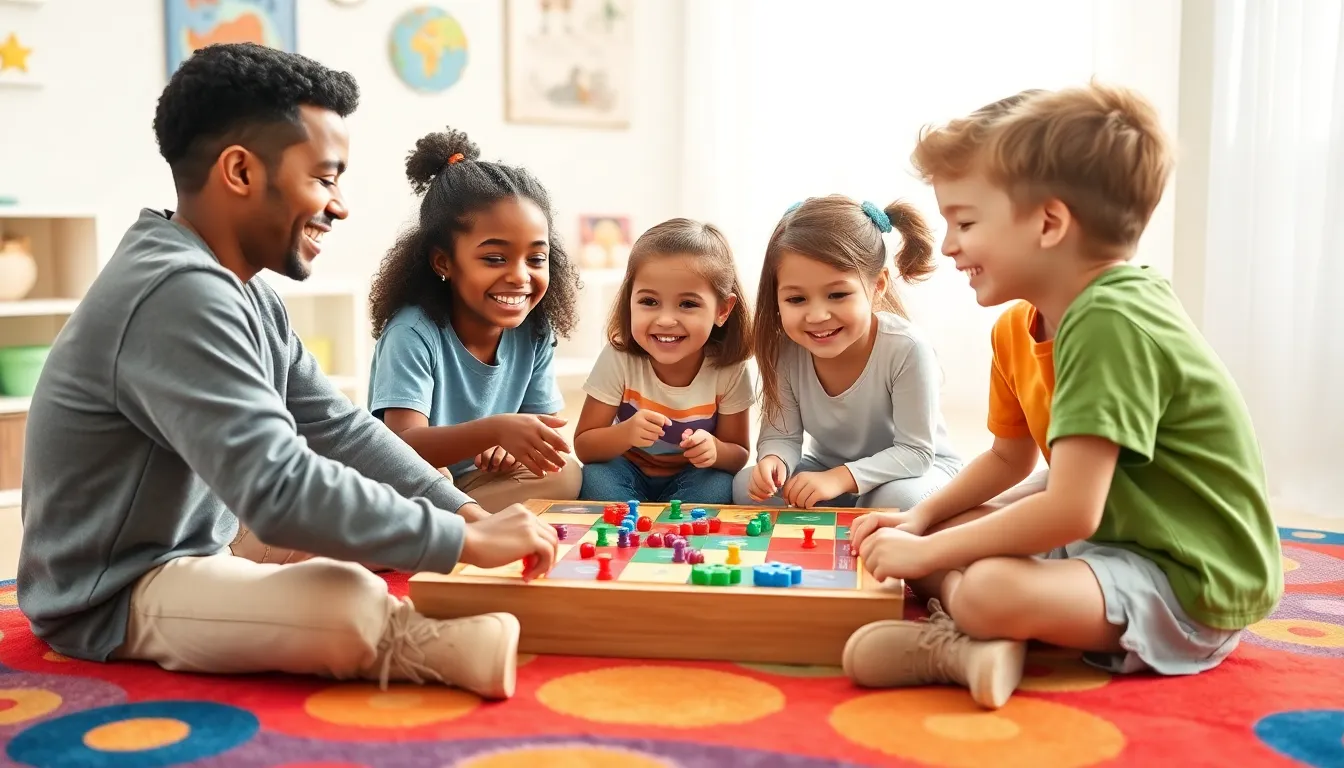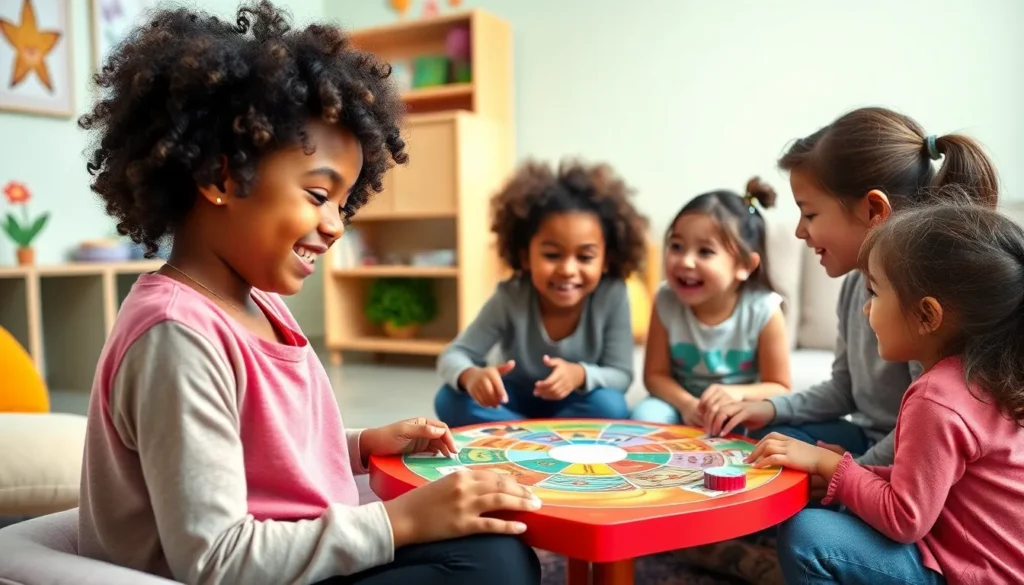In a world where kids are juggling school, friendships, and the occasional existential crisis, therapy games for kids are the secret sauce to help them thrive. Imagine turning emotional challenges into playful adventures—sounds like a game-changer, right? These interactive activities not only make therapy fun but also empower children to express their feelings and develop essential coping skills.
Forget the stereotype of therapy being all serious and somber. With the right games, kids can tackle their worries while laughing and bonding with their therapist. Whether it’s through role-playing, art, or imaginative play, these games transform the therapy room into a vibrant space where healing happens naturally. So why not dive into the world of therapy games and discover how they can make a difference in your child’s emotional journey?
Therapy Games for Kids
Therapy games for kids promote emotional expression and coping skills. These activities are designed to make therapy sessions more engaging and enjoyable. Through play, children explore their feelings in a safe environment. They build connections with therapists, forming trusting relationships that facilitate healing.
Different types of therapy games address various emotional and developmental needs. For instance, role-playing games encourage kids to act out scenarios, enabling them to process difficult situations. Board games often reinforce social skills and teamwork, while digital games can enhance cognitive and emotional regulation.
Therapists can tailor each game to align with a child’s specific challenges. Individualize experiences for kids struggling with anxiety, depression, or behavioral issues. The flexibility of therapy games lets therapists adapt sessions based on each child’s progress or mood.
Parents play a crucial role in this dynamic. They can reinforce lessons learned during sessions by incorporating related activities at home. Engaging with children outside therapy deepens their understanding and application of coping strategies.
Evidence supports the effectiveness of therapy games in improving children’s mental health. Studies indicate that kids exposed to play therapy show significant improvement in mood and behavior. Through structured play, children develop resilience and emotional awareness.
Consistency proves beneficial. Regular participation in therapy games can lead to lasting behavioral changes. As children gain skills, they become better equipped to face life’s challenges. Therapy games not only offer immediate relief but also foster long-term emotional well-being.
Benefits of Therapy Games

Therapy games provide numerous advantages for children, enhancing their emotional and social development while facilitating effective coping strategies.
Emotional Development
Emotional expression flourishes through therapy games, allowing kids to navigate their feelings comfortably. Play helps children articulate emotions they might struggle to express otherwise. Engaging with these games encourages self-awareness, enhancing their ability to recognize and manage emotions. Moreover, therapy games can lead to increased resilience, equipping children to handle future emotional challenges. Children learn valuable coping mechanisms that form the basis for lifelong emotional health.
Social Skills Enhancement
Social interactions improve significantly through therapy games, fostering teamwork and communication. Kids practicing turn-taking and sharing develop essential social skills in a non-threatening environment. Enhanced cooperation occurs as children work together to solve problems within the games. Relationships with peers and therapists strengthen, building trust and a sense of belonging. Additionally, these games encourage empathy, as kids learn to understand others’ feelings and perspectives. By boosting social skills, therapy games pave the way for healthier peer relationships and overall social success.
Types of Therapy Games
Therapy games come in various forms, each designed to meet children’s unique emotional and developmental needs. Here are some common types.
Interactive Play
Interactive play engages children in hands-on activities, fostering creativity and self-expression. Games like art projects or sensory activities encourage kids to articulate their feelings. Therapists often use props or toys, which help explain complex emotions. These playful interactions can break down barriers, making it easier for children to open up. Offering choices during play enhances children’s decision-making skills. Examples include building blocks or puppet shows that stimulate imagination while addressing emotional challenges.
Role-Playing Games
Role-playing games allow children to assume different personas, enabling them to explore their feelings in a safe environment. Activities like make-believe scenarios encourage empathy by allowing kids to experience situations from various perspectives. Through role-play, therapists can help children process real-life events, making therapy sessions more relatable. Kids learn how to express emotions and practice problem-solving skills. Examples of role-playing games include dress-up sessions or storytelling games that facilitate discussions on emotions and social dynamics.
How to Implement Therapy Games
Implementing therapy games involves creating a supportive environment and selecting appropriate activities. Focus on engaging children and providing experiences that facilitate emotional growth.
Setting Up Your Space
Create a comfortable area for therapy sessions. Utilize soft seating and calming colors to promote relaxation. Ensure the space is free from distractions so children can focus on the activities at hand. Incorporate various materials like art supplies and toys to enhance engagement. Design this environment to encourage movement and interaction, fostering a sense of safety. Check the layout periodically, adapting it to each child’s preferences and needs. A well-organized space helps children feel secure and open to expressing themselves.
Choosing the Right Games
Identify games that align with children’s emotional and developmental needs. Evaluate options such as role-playing activities, board games, or digital games. Select games that encourage emotional expression and problem-solving skills. Consider children’s age and interests when choosing activities; this increases engagement. Look for games that promote teamwork and communication, as these skills are vital for social development. A variety of choices caters to individual preferences, making therapy sessions more effective. Prioritize games with clear objectives that facilitate learning and self-awareness.
Conclusion
Therapy games offer a dynamic approach to supporting children’s emotional health. They transform the therapeutic process into an enjoyable experience where kids can learn and grow. Through play, children not only express their emotions but also develop essential life skills that serve them well beyond therapy sessions.
By engaging in these interactive activities, kids can build resilience and enhance their social interactions. Parents play a vital role in reinforcing these lessons at home, ensuring that the benefits of therapy games extend into daily life. Embracing this innovative method can lead to lasting positive changes, equipping children with the tools they need to navigate their world confidently.

